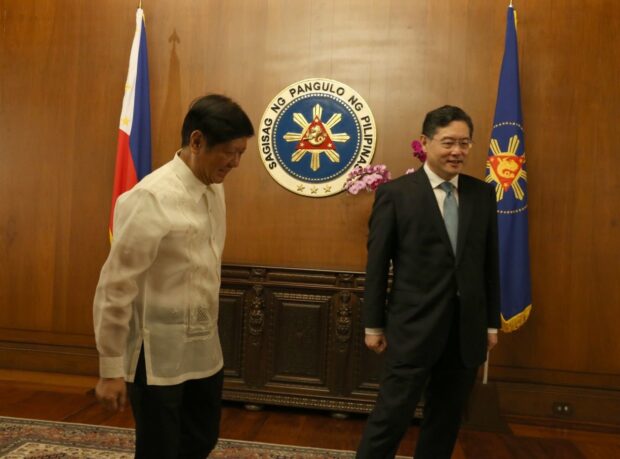
President Ferdinand Marcos Jr. meets with Chinese Foreign Minister Qin Gang in Malacañang. (Presidential Photojournalists Association Pool via Nestor Corrales / Philippine Daily Inquirer)
MANILA, Philippines — President Ferdinand Marcos Jr. met on Saturday with Chinese Foreign Minister Qin Gang a week after China’s ambassador to the Philippines stirred controversy when he openly “advised” Manila to oppose the independence of Taiwan if it truly cared for the 150,000 overseas Filipino workers on the self-ruled island.
Qin’s visit follows Beijing’s repeated warnings over the Philippines’ decision to expand US military presence in the country by giving access to US forces to Philippine military bases under the Enhanced Defense Cooperation Agreement (Edca) between Manila and Washington.
The nine Edca sites include three in the northern Cagayan Valley region close to Taiwan.
Edca allows the United States to preposition military materiel and disaster aid supplies for deployment during calamities in the Philippines.
The visit by China’s top diplomat comes ahead of the President’s trip to Washington on May 1 for talks with US President Joe Biden on wide-ranging issues between the two treaty allies.
Around 18,000 Filipino and American troops are currently holding their largest-ever joint military exercises in the country.
‘Misinterpreted’
In a statement after his closed-door talks with Qin, President Marcos said he had a “productive” meeting with the Chinese official as they ironed out recent issues between the Philippines and China.
“Some of the pronouncements that have been made recently by our two countries and many other countries might be misinterpreted,” Marcos said without elaborating.
But he was apparently referring to Chinese Ambassador Huang Xilian’s speech on April 14.
“So today,” Marcos said, “it was really useful that we were able to speak with Minister Qin Gang, the foreign minister of China, so we can talk directly to one another and iron things out.”
“It’s very, very useful and very, very productive that Minister Qin came here and that we were able to talk things a little bit through, make plans for the future, continue to work on growing the relationship between the Philippines and China, not only in the economic field but in the cultural and educational and other exchanges,” he added.
Dispute ‘hotline’
Marcos also said Manila and Beijing agreed “to establish more lines of communications so that any event that occurs in the West Philippine Sea that involves China and the Philippines can immediately be resolved.”
During the president’s visit to China in January, the two countries decided to set up a hotline between their foreign ministries that would be used to prevent an escalation of any maritime dispute.
Marcos earlier told reporters he would summon Huang to explain what he meant by his statement, which the ambassador made during a forum organized by the Association for Philippines-China Understanding.
It was unclear whether the president raised this matter on Saturday with Huang, who accompanied Qin to Malacañang.
Qin’s four-day visit was preceded by a trip to Manila by his deputy, Vice Foreign Minister Sun Weidong, on March 22 to attend the 23rd Philippines-China Foreign Ministry Consultation and the seventh meeting of the Bilateral Consultation Mechanism on the South China Sea.
Qin and Foreign Secretary Enrique Manalo held a separate meeting also on Saturday.
“Our leaders have agreed that our differences in the West Philippine Sea are not the sum total of our relations,” Manalo said in his remarks. “These differences should not prevent us from seeking ways of managing them effectively.”
He referred to “incidents and actions” in the West Philippine Sea which had undermined the “livelihood and general wellbeing” of Filipino fisherfolk, who have been kept away from their traditional fishing grounds by the Chinese Coast Guard and China’s maritime militia.
Qin said China was willing to work with the Philippines in maintaining regional stability.
“We need to work together to continue our traditional friendship, deepen mutually beneficial cooperation, and properly resolve our differences in the spirit of credibility, consultation, and dialogue,” Qin said.
He said they must “keep our promises” to inject “greater positive energy for the peace and stability of this region and even the whole world.”
The Department of Foreign Affairs said in a statement that Manalo “reaffirmed” the Philippines’ one-China policy “while at the same time expressing concern over the escalating tensions across the Taiwan Strait.”

